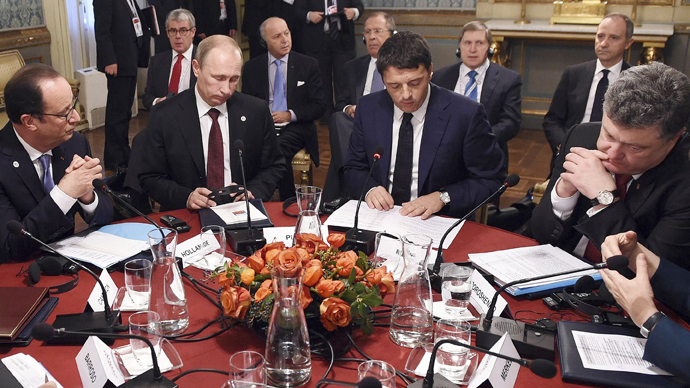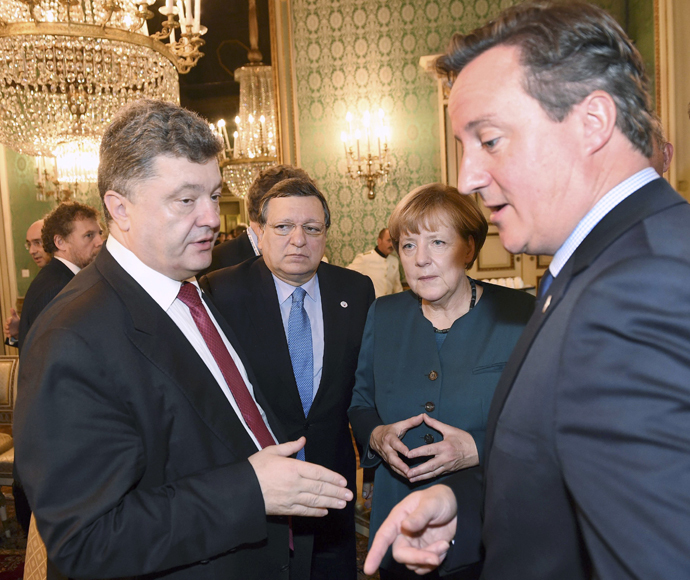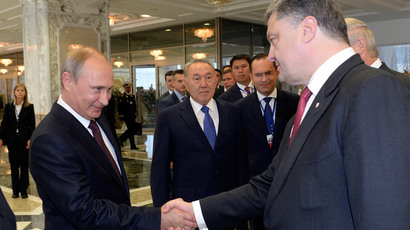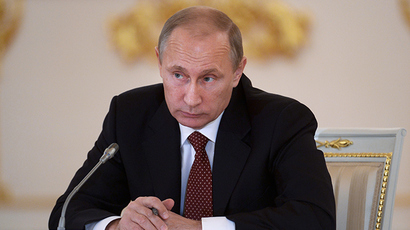‘Difficult, full of disagreements’: No breakthrough in Milan talks on Ukraine crisis

The talks on the Ukrainian crisis, where the presidents of Russia and Ukraine have met with their European counterparts, have resulted in “no breakthrough,” according to Chancellor Merkel, but were still labeled “positive” by most participants.
The presidents of Russia and Ukraine met on Friday morning in Milan on the sidelines of the summit of Asian and European leaders in Italy. They were joined by German Chancellor Angela Merkel, French President Francois Hollande, British Prime Minister David Cameron and European Commission President Jose Manuel Barroso.
"I cannot see a breakthrough here at all so far," Merkel said after the meeting, according to Reuters.
"We will continue to talk,” she added. “There was progress on some details, but the main issue is continued violations of the territorial integrity of Ukraine."
A political solution to the conflict in Ukraine has not yet been found, President of the European Council Herman Van Rompuy commented on the talks and urged both Russia and Ukraine to follow through on the peace agreement reached in Minsk, Belarus at the beginning of September.
“What we agreed was the protocol of Minsk on the ceasefire, and the peace plan is of crucial importance,” Rompuy said. “We have to implement this. This would guarantee again a future for Ukraine. So implementation, implementation, implementation — those are the key words.”
Vladimir Putin has so far been laconic in his assessment of the talks’ outcome.
"It was good, it was positive," the smiling president told reporters after the event, Reuters reported.
It was Putin’s spokesman, Dmitry Peskov, who eventually elaborated on the negotiations, describing them as “difficult” ones.
“The negotiations are really difficult, full of disagreements, full of misunderstandings,” Peskov said. “Nevertheless they are still taking place. There’s an exchange of opinions.”
“The participants have discussed in detail the implementation of the Minsk agreements,” Peskov said.
“Unfortunately, some of the breakfast participants demonstrated their complete reluctance to understand the real situation in the southeast of Ukraine.”
Ukrainian President Petro Poroshenko complained to Austria's chancellor Werner Faymann later in the day, that the morning talks did not leave him hopeful about achieving a breakthrough in the crisis.
"Unfortunately, I am not very optimistic," Reuters cited Poroshenko as saying.

Other European leaders, who participated in the talks, seemed to be more encouraged by their outcome. "Positive” has been the most frequently used definition.
Italian Prime Minister Matteo Renzi, who hosted the meeting said he was “really positive” after it, although he also acknowledged "a lot of differences" remained.
"It was a very positive meeting," said British Prime Minister David Cameron, according to AFP. "Vladimir Putin said very clearly that he doesn't want a frozen conflict and he doesn't want a divided Ukraine."
Russian President Vladimir Putin and Ukraine's President Petro Poroshenko had one more meeting later in the day trying to resolve the crisis. This time they were only accompanied by German Chancellor Angela Merkel and French President Francois Hollande.
Russian President Vladimir Putin and Ukraine's President Petro Poroshenko had one more meeting later in the day in an effort to resolve the crisis.
Putin was once again concise, commenting on the outcome.
“The results of the talks are good,” he told journalists when he left the negotiations room, TASS reported.
Petro Poroshenko announced that the meeting had resulted in a preliminary agreement on Russian gas supplies to Ukraine.














